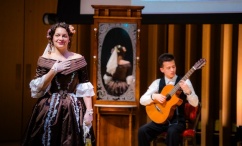Costume Studies
.png.lt_d2c8921b010479b996fe0dcf4bb663b3.res/Untitled%20(14).png)
Dalhousie’s Costume Studies program is unique in Canada, and offers a four-year BA with Honours in Theatre (Costume Studies). At Dal’s Fountain School of Performing Arts you’ll study to develop your research and academic skills while building your applied skills through hands-on learning. We have a strong historical focus on both theatre and museum work.
You’ll obtain a firm foundation in:
•designer’s language
•tailoring
•the aesthetics of historical and modern dress
•pattern designing of garments from 1680 to the present
•costume as sculpture
•costume technology
•costume in performance.
By graduation, you’ll be able to construct and create costumes from any historical period and for various gender identities. You’ll also acquire the problem-solving and research skills expected of professional artists with a broad liberal arts education.
Learn more about admission requirements at Dal.
Contact the Fountain School's Associate Director for Theatre, to learn more.
In your applied skills classes, you’ll obtain a firm foundation in:
•the designer’s language
•tailoring
•the aesthetics of historical and modern dress
•pattern designing of garments from 1680 to the present
•costume as sculpture
•costume technology
•costume in performance.
Dalhousie’s Costume Studies students learn how to create clothing from any historical period using bespoke, one-of-a-kind couturier methods. You’ll also learn why and how clothing contributes to the formation of personal, community, and cultural identities.
Our Fountain School students gain a strong proficiency in costume history from antiquity to the present, exploring why people clothed themselves as they did, and paying particular attention to the social and cultural influences at play, along with class and gender differentiation.
In addition to class projects and assignments, you’ll test your new applied and academic skills while working on costumes for the Fountain School's theatre and opera productions under the guidance of faculty and guest costume and set design artists. You’ll also create a major historical research project, at the end of the academic year, which you share with the public at our Historical Dress Presentation in our new Joseph Strug Concert Hall.
These two components of the program – one grounded in the magic of theatre, one steeped in the sensuality of history – showcase students progress and allow students to gauge public reaction to their work, a valuable part of their education experience.
Students come to Dalhousie’s Costume Studies from all across Canada and the United States. They quickly form a special bond and make friends for life. Our Costume Studies alum have a far-reaching network throughout North America and share a camaraderie not experienced by those in large university programs.
The Costume Studies facilities are located in our stunning new Fountain School of Performing Arts building on Dal’s campus, at 1385 Seymour Street in Halifax. It sits next to the Dalhousie Arts Centre building on University Avenue which is home to other Fountain School learning spaces, including our Sir James Dunn Theatre, and the more intimate David Mack. Murray Studio. Dalhousie has a beautiful campus, with its grassy, leafy quad surrounded by the original stone nineteenth-century buildings.
Check out this Dal Campus tour! Jump to the six-minute mark, if you are short on time.
The Honours BA in Theatre (Costume Studies) was offered for the first time in 2005, but has its foundations firmly rooted in the Costume Studies Program which was begun at Dalhousie in 1976. It is a mature program which, in addition to equipping students to find employment in theatres, film, television, and living history museums, among others, also enables them to pursue postgraduate education upon completion of the BA.

